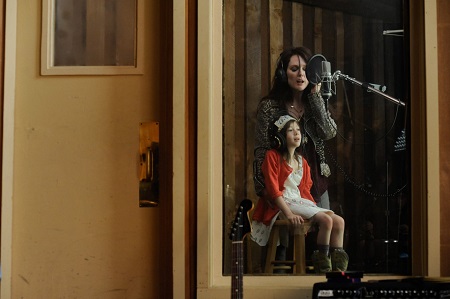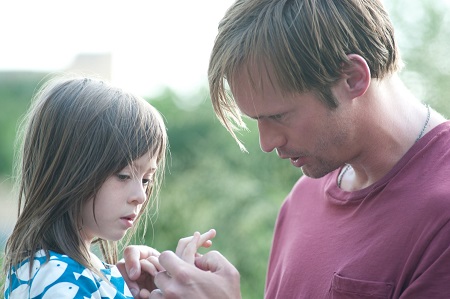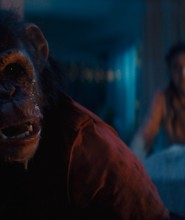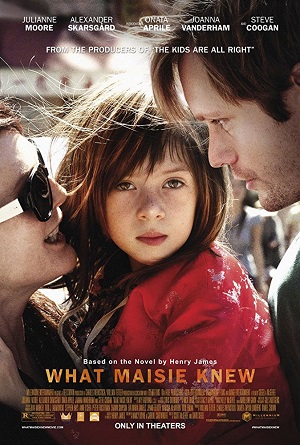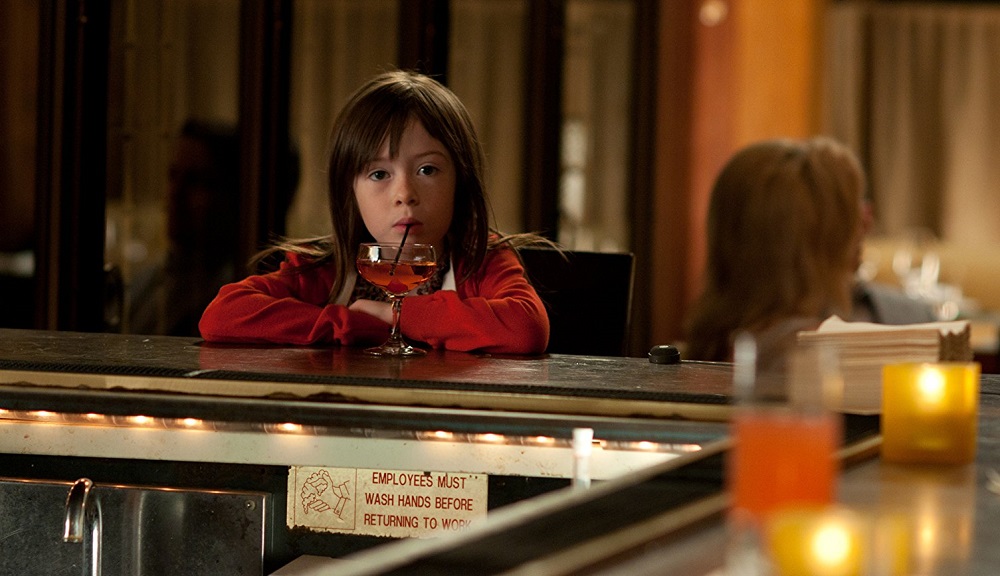
What Maisie Knew (2012)
by Sara Michelle Fetters - May 24th, 2013 - Film Festivals Movie Reviews
a SIFF 2013 review
Deft Maise a Heartfelt Celebration
For six-year-old Maisie (Onata Aprile), staying a kid is proving to be a difficult proposition. Her aging rock star mother Susanna (Julianne Moore) and art dealer father Beale (Steve Coogan) are going through a nasty divorce, and while they’re trying not to put their little girl smack-dab in the middle of things they’re both failing in those efforts rather spectacularly.
Time passes. Maisie goes to school, bouncing between her two parents and not quite understanding what is going on yet still knowing things are not as they should be. When her loving nanny Margo (Joanna Vanderham) suddenly marries Beale, Susanna looks to get back at him by getting hitched to sexy groupie Lincoln (Alexander Skarsgård), an aspiring chef moonlighting as a bartender. But while her parents continue to bicker, fight and take their little girl for granted, Maise begins to grow increasingly closer to both Margo and Lincoln, each a loving parental figure she quickly learns she can count on and trust to do what’s best for her.
A modern day adaptation of the Henry James novel, What Maisie Knew is an emotionally-charged, delicately authentic knockout tale of a child learning to circumnavigate an adult world while maintaining her wide-eyed exuberance about life and its potential in the process. Directed by Scott McGehee and David Siegel (The Deep End), with a screenplay by Nancy Doyne and Carroll Cartwright, the movie is deft reimagining that maintains its intimate point-of-view with little to no effort at all. Seen entirely through the eyes of its kindergarten-aged heroine, the inherent dramatics are eloquently presented, everything building to a stupendous final scene that blew me away.
I loved how stripped down everything feels, how McGehee and Siegel go out of their way to make sure the audience can decide for themselves who these people are, what makes them tick and how they are going to react to Maisie’s pint-sized needs. The film traverses a number of grey areas with courage and conviction, going out of its way to not transform some characters into saints while portraying others as one-dimensional monsters. Instead, all four of the adults make choices, that’s it, and while some are good a number of them obviously are not, how they all deal with the fallout of these decisions and what Maisie learns in the process the core elements everything revolves around.
This isn’t as easy as it might sound. Both Susanna and Beale are being selfish, looking out for their own self-interests instead of their daughter’s. Margo should know better, the young twenty-something nanny falling into one of New York’s most tired and overused clichés when she decides to marry the father of her tiny charge. Lincoln leaps without considering the consequences, so starstruck he doesn’t consider that by wedding the object of his most fevered rock star fantasies he’s going to instantly become a father in the process.
Yet the writing doesn’t allow for shortcuts, all of the adults showcasing emotional layers necessary for the drama to succeed yet also somewhat unexpected considering the subject matter. The performances are outstanding, Moore, Coogan, Skarsgård and relative newcomer Vanderham all rising to the occasion. The level of understanding, the amount of restraint, everything comes together in extraordinary fashion, allowing the emotions at the heart of the narrative to speak clearly and persuasively.
It can get a little too ephemeral, the directors stripping down Doyne and Cartwright’s script so much it can all become slightly structurally obtuse at times. Time passes in a haphazard manner, and figuring out just how much of it has transpired isn’t always possible. As fairly treated all four adults might be, Coogan’s Beale is given a bit shorter shrift than the others, the nondescript way he handles some of the third act transitions not sitting as well with me as they potentially could have had the filmmakers allowed things a little more room to breathe.
These feel like minor problems, especially considering the sterling depths the majority of the movie manages to traverse with such sure-footed confidence. Anchoring it is little Aprile, delivering a delicate and complex performance that caught me by surprise. The way she deals with events as they happen is consistently captivating, everything building to a penultimate moment with Moore that had me drowning in overjoyed tears. It’s somewhat revelatory, and while the assistance of her extremely talented costars is both necessary and obvious, the fact she manages to take on so much of the heavy emotional lifting upon her own miniscule shoulders is still impressive.
I wasn’t familiar with James’s source material before seeing the movie, but I did take a look at it afterwards (it’s a quick read) and as a lot of the prose isn’t utilized here familiarity with the book isn’t exactly necessary. The writers have a done a wonderful job of staying true the novel’s themes, Doyne and Cartwright making sure everything the author was talking about takes shape inside their exquisitely intricate adaptation.
For McGehee and Siegel, What Maisie Knew is an undeniable triumph. I’ve always been rather hit-and-miss with the directors, enjoying films like Suture and The Deep End while being more than underwhelmed, to the point of borderline disgust, by other efforts like Bee Season. With this movie, with this celebration of life, they duo are firing on all cylinders, their honing of the material and shaping of its story so precise I was thoroughly impressed. They’ve managed to craft a motion picture that speaks to the heart and elevates the soul, doing so with an effortless candor that captured me whole. I loved this film, and in the end I imagine no more needs to be said.
Film Rating: 3½ (out of 4)
Additional Link:
Interview with directors Scott McGehee and David Siegel


